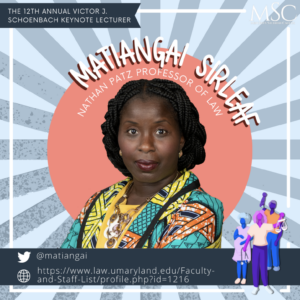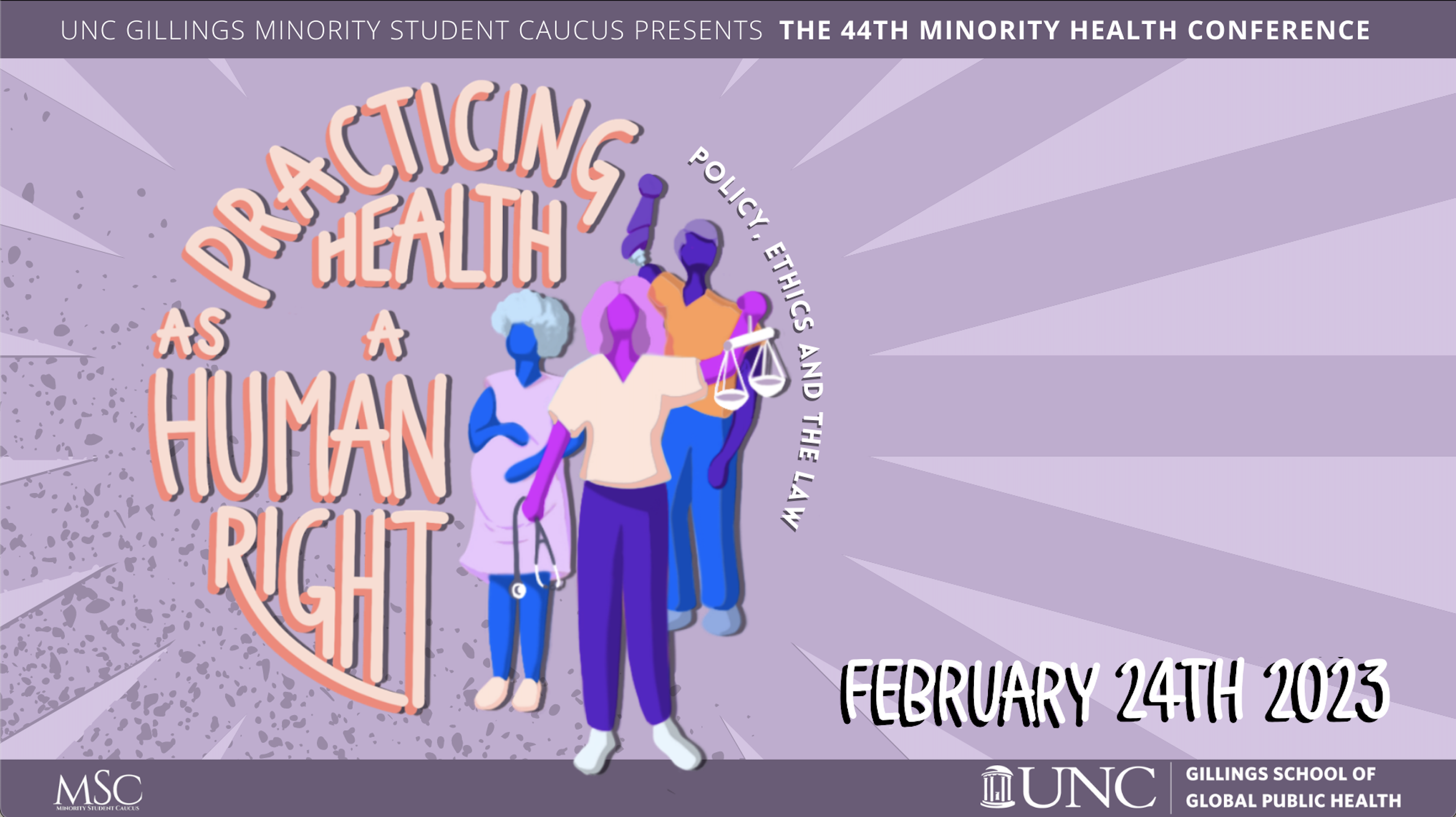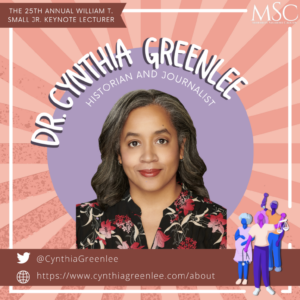44th Minority Health Conference Events
The 44th Annual Minority Health Conference was a success!
Thank you to our attendees, keynotes, breakout session speakers, poster presenters, sponsors, and everyone who helped make the conference possible.
44th MHC Agenda
Please fill out this evaluation survey for feedback of the 44th Annual Minority Health Conference!
Cynthia Greenlee, PhD
Biography
Dr. Cynthia R. Greenlee is a historian and journalist based in North Carolina. A former editor at Rewire.News, she is a noted expert on reproductive health, particularly abortion among Black and Southern Americans. Her journalistic work has appeared in publications as diverse as The Atlantic, The New York Times, Smithsonian, Vox, and others. She was the lead editor of “The Echoing Ida Collection,” (Feminist Press), an anthology of Black women and nonbinary writers exploring reproductive and social justice. Dr. Greenlee is a two-time UNC-Chapel Hill graduate, with bachelor’s degrees in international studies and history as well as a master’s in journalism and mass communication. She earned her PhD at Duke. She is also an alumna of the Morehead Scholars (now Morehead-Cain) program at UNC and a winner of a coveted James Beard Award, the highest honor in American food writing.
Abstract
“She went to the Negro doctor”: Black physicians, surveillance and abortion in the Jim Crow South
In the days before Roe v. Wade, women often crossed many lines to get abortions. They traveled across states and sometimes state lines, and they often traveled across racial boundaries. Pregnant and trying not to be, many white abortion seekers sought out Black abortion providers — some medical professionals and others not — in hopes that those workers were more likely to provide the service and to increase the likelihood of privacy by going to another community. The reality, however, was often quite different — and particularly for Black abortion workers who became dangerously visible when they accepted white clients. In this talk, Dr. Greenlee sheds light on the costs of the illegal era, by discussing the cases of two 20th-century Black physicians caught in legal crosshairs. Each wound up in North and South Carolina courts precisely because they were suspected of terminating white pregnancies. And each was uniquely vulnerable to prosecution in Jim Crow’s racial state, as one of a few Black doctors operating in their respective spaces and, in one case, due to civil rights activism in the 1950s.
Matiangai Sirleaf
Biography
 Matiangai Sirleaf is the Nathan Patz Professor of Law at the University of Maryland School of Law. She writes and teaches in the areas of global public health law, public international law, international human rights law, and researches the disproportionate distribution of highly infectious diseases and the role of international law in facilitating this result. Professor Sirleaf’s scholarly agenda is to make visible the extant hierarchies in international law and to remedy the inequities reflected in it. Professor Sirleaf has received a number of prestigious grants, awards, fellowships, and other honors. These include the University of Pittsburgh Chancellor’s Distinguished Research Award (2019), the American Society of Law, Medicine & Ethics Health Law Scholar Selection (2019), the New York University Martin Luther King, Jr. Humanitarian Award (2014) and a Fulbright Fellowship (2004). A graduate of Yale Law School, the University of Ghana Legon Center for International Affairs, and New York University College of Arts and Sciences, Professor Sirleaf has served in a number of attorney and fellow roles prior to entering academia.
Matiangai Sirleaf is the Nathan Patz Professor of Law at the University of Maryland School of Law. She writes and teaches in the areas of global public health law, public international law, international human rights law, and researches the disproportionate distribution of highly infectious diseases and the role of international law in facilitating this result. Professor Sirleaf’s scholarly agenda is to make visible the extant hierarchies in international law and to remedy the inequities reflected in it. Professor Sirleaf has received a number of prestigious grants, awards, fellowships, and other honors. These include the University of Pittsburgh Chancellor’s Distinguished Research Award (2019), the American Society of Law, Medicine & Ethics Health Law Scholar Selection (2019), the New York University Martin Luther King, Jr. Humanitarian Award (2014) and a Fulbright Fellowship (2004). A graduate of Yale Law School, the University of Ghana Legon Center for International Affairs, and New York University College of Arts and Sciences, Professor Sirleaf has served in a number of attorney and fellow roles prior to entering academia.
Abstract
White Health as Global Health
European imperial expansion meant that public health concerns became globalized and required cooperation with other imperial powers for the treatment and prevention of diseases. This lecture will trace the role of race and racism in the development of global public health law. It explores the connections, legacies, vestiges, and important disjunctions between tropical medicine and global public health. This reflection considers the primacy given to White health as one of the animating purposes behind the emergence of the global public health regime. The centrality of protecting the health of White people and interests then and now continues to inform the global health agenda.
These remarks will surface the role of international law through omission and commission in structuring and reifying racialized hierarchies of care and concern. The COVID-19 pandemic has created an opening to not only recognize, but to potentially reshape the relationship between race and global health. This talk will discuss recent efforts at reform and assess whether they provide a path to address past and continuing effects of racism in global public health. It concludes with the hope that bourgeoning efforts to decolonize global public health and to address racial inequities will not be ephemeral.
Breakout Sessions and Posters
1. Improving Healthcare by Addressing Ableism from an Intersectional Lens | Leah Smith, Rhonda Holiday, & Maureen Van Stone
2. From Reporting to Supporting: Creating Equitable Futures for All Families | Kamaria Excell & Jasmine Wall
3. Let’s Talk: Justice, Equity, Diversity, Inclusion, and Accessibility (JEDIA!) | Kevin M. Coleman
4. Redlining Maternal Health: An Overview of the Lasting Impact of Historically Racist Housing Policies on the Health of Birthing People of Color in North Carolina | Alyssa Crawford & Ta’Jalik Morgan
5. Disrupt the Status Quo: Mitigating Bias in the Delivery of Menopause Healthcare | Taniqua Miller (Virtual Presentation)
6. Eating Right, or the Right to Eat? Centering Culture, Agency, and Equity in Nutrition | Jasmine Westbrook & Adante Hart
7. A Community-Based Approach to Addressing HIV and Social Determinants: The ID Youth Council | Judith Rivera, Aliysha Maragh-Bass, Orion Chambers, & Eyerys Corely
8. First in Flight: Stop Trying to Fly Unbuilt Planes and Calling it Equity | Cornell P. Wright
- A New Life: Exploring Somali Refugee Women’s Maternal Healthcare Experiences in North Carolina | Author & Presenter: Amina Mohamed
- A North Carolina Zip Code Specific Analysis of Community and Environmental Social Determinants of Health Variables and Health Outcomes: Mortality and Ambulatory Care Sensitive Conditions | Authors: Alicia Primus, Dr. Mary Cooley, Dr. Kit Simpson, & Dr. Jiebing Wen | Presenter: Alicia Primus
- Agency or Not for Sexual Negotiation among Young African American Women in North Carolina: Context or Communication | Authors: Ekene C. Osakwe, Isa van de Drift, Claudia Opper, William Zule, Felicia A. Browne & Wendee Wechsberg | Presenter: Ekene C. Oaskwe
- Analyzing Patient Odds of Receiving Dental Care within a Given Year Based on Racial/Ethnic Background, Poverty Level, and Geographical Information | Author & Presenter: Hope L. Everingham
- Assessing and Addressing Access to Sexual Health Preventative Care Among Young African American Women in North Carolina | Authors: Claudia Opper, Dr. Felicia A. Browne, Dr. Courtney P. Bonner, Jaqueline Ndirangu, & Dr. Wendee M. Wechsberg | Presenter: Claudia Opper
- Centering the Margins: Applying Public Health Critical Race Praxis in Exploring Black Adolescent and Young Adult Fatherhood | Authors: Kiara Hunter & Dr. Stephanie Baker | Presenter: Kiara Hunter
- Community Based Participatory Research: Collaboration Between an Academic and Community Partner to Reduce Gun Violence in Charleston, South Carolina | Author & Presenter: Dr. Sarah B. Maness
- Effects of State-Level Unemployment Insurance Accessibility and Policy Features on CVD Rates in the United States | Authors: Phenesse Dunlap, Dr. Melvin Livingston, Dr. Regine Haardoerfer, Dr. Amit Shah, & Dr. Kelli Komro | Presenter: Phenesse Dunlap
- Examining HIV Risk and Prevention Strategies in the Arab American Community in the United States | Author & Presenter: Syreen Goulmamine
- Making Sense of Medical Gaslighting: A Qualitative Study of the Experiences of BIPOC Women with Health Care Professionals in the United States | Authors: Simone Llanos-Taminez & Dr. Cynthia Fair | Presenter: Simone Llanos-Taminez
- Re$ourcing The Village: Using Small Community Engagement Awards to Build African American Commercial Tobacco Control Community Capacity and Power | Authors: Camille A. Cummings, Carol McGruder, & Y’Lonn Burris | Presenter: Camille A. Cummings
- Research Team Perspectives on Engaging Black Patients with Cancer in Biospecimen Research | Authors: Aaron Carpenter, Hayley Morris, Annabella Opoku, Allison Hilton, Jessica Carda-Auten, Randall Teal, Jeenn A. Barreiro-Rosado, Lauren Matthews, Oluwatumilara Akeke, Ashley Rankin Collins, & Marjory Charlot | Presenters: Aaron Carpenter & Jeenn A. Barreiro-Rosado
- Self-Rated and Limited English Proficiency Among LatinX Young Adults: Mediating and Moderating Factors | Authors: Carmen Rauh & Dr. Rosa Gonzalez-Guarda | Presenter: Carmen Rauh
- “Simply ask and explain”: Perspectives from Black Patients with Lung Cancer on Strategies to Address Racial Disparities in Biospecimen Research Participation | Authors: Jeenn A. Barreiro-Rosado, Oluwatumilara Akeke, Annabella Opoku, Allison Hilton, Jessica Carda-Auten, Randall Teal, Aaron Carpenter, Hayley Morris, Lauren Matthews, Ashley Rankin Collins, & Marjory Charlot | Presenter: Jeenn A. Barreiro-Rosado
- Social & Community Barriers to a Breastfeeding Family Friendly Community| Author & Presenter: Love Anderson
- Using Community Advisory Boards to Culturally Tailor Diabetes Outreach Targeting Latino Men | Authors: Dr. Jeanette Wade, Thais Rivas, Kennedy Owens, & Kaylah Robinson | Presenter: Dr. Jeanette Wade
- Visual Map of Facilitators and Barriers to Equitable Maternal Healthcare: A Comprehensive Review| Authors & Presenters: Zara N. Mehta & Dr. Kristin Z. Black | Presenter: Camille A. Cummings
About the Minority Health Conference
The Minority Health Conference is the largest and longest-running student-led health conference in the country. The conference aims to raise awareness around health disparities and mobilize students, academics, and community members to take action for change. Started in 1977 by the Minority Student Caucus, the conference is nationally recognized and respected, attracting more than 500 attendees each year and hundreds more who view it via webcast.
Organized by the UNC Minority Student Caucus at the Gillings School of Global Public Health.

